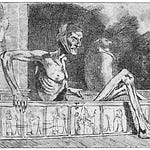En este Segundo Círculo del Infierno, nos encontramos con Minos, como el juez inmisericorde que determina a qué nivel del Infierno va cada condenado. Y comenzamos a conocer a algunos de los condenados en este Segundo Círculo (o el primero de los que han sido condenados por sus actos): Semíramis, Dido, Cleopatra, etc. Pero ninguno de ellos tiene tanta influencia en Dante como la pareja formada por Francesca da Rímini y Paolo Malatesta.
Francesca da Rímini y Paolo Malatesta, por Anselm Feuerbach en 1864 (WIKIPEDIA).
Podéis encontrar más imágenes en esta página de Rímini y su provincia.
En cuanto al material usado, he consultado dos libros:
1.- Divina Comedia, Dante Alighieri, de Alianza Editorial. Version poética de Abilio Echeverría, año 2012. ESP.
2.- Divina Commedia, Dante. Edizione Integrali con note e dizionario Dantesco. Introduzioni di Stefano Carrai, Giuseppe Conti e Fabio Pusterla. Editorial Giunti-Barbèra. Año 2022. IT.
También se han utilizado páginas de internet como World History, Biografias y vidas y otras relacionadas con la Historia Antigua.
Por último, como siempre, recomiendo el genial artículo de
sobre este Canto V:Singleton points out the framing of lines 100-108 as anaphoric in the repetition of Love…Love…Love in the three stanzas. The first two stanzas point to two laws of love, the third, to it’s consequence. So, “Love, that can quickly seize the gentle heart” (100) and “Love, that releases no beloved from loving” (104), and the consequence was their “one death” (106). To point to these as laws almost takes the blame from the lovers, as if love acted upon them and they had no choice but to obey. Here, perhaps, is one reason that this story resonates so deeply; if they could not help but be swayed by a love that overtook them, is it just that they are punished? Their passion was so great that it followed them, unchanged in form, into Hell.
(…) The sinners in Inferno as well as in Purgatorio are punished by the sin that made them lose their ‘reason.’ In the case of Dido, she suffers because of her lust, lust that leads her to commit the tragic action - she made her reason subject to desire. Her sin was not the despair that drove her to take her own life, but the surrender of reason to uncontrollable desire. This is why we find her in the circle of lust and not in the circle of the violent.
‘The gate is wide’ says Minos to our companions. The sin that causes you to lose your reason gives rise to another, and Divine justice holds you accountable for the original transgression that led you astray.
Uno de sus comentaristas escribe lo siguiente:
There’s a tale from Roman military yore (retold in the modern military) that’s an analogous to his experience here: When centurions conducted their inspections of legionaries, it was the custom that each soldier, on the approach of the centurion, would strike the armor breastplate that covered his heart with his right fist — where it had to be strongest to protect the heart — and shout “Integritas!” (Indicating not only wholeness and completeness of his armor, but also of his commitment to protect the Empire). That declaration was changed a century later to “Integer!” (undiminished – complete – perfect, indicating not only that the armor was sound, but that the soldier was sound of character.) The legionaire’s heart had to be as sound and rightly-ordered as his armor. The word integrity derives from “Integer;” in this canto, integrity means living in harmony with the meting out of divine justice — even for those “lightly carried by the wind.” At the end of his journey, that integrity will be rewarded with divine love and eternal happiness. Dante (barely) passes this test, but it has thickened his armor and hardened his heart. He is learning the lesson of Proverbs 11:3: “The integrity of the upright guides them, but the unfaithful are destroyed by their duplicity.”
En el siguiente capítulo, nos toca el Canto VI, el Cancerbero y los Glotones.
Buy me a coffee. ☕️














Share this post